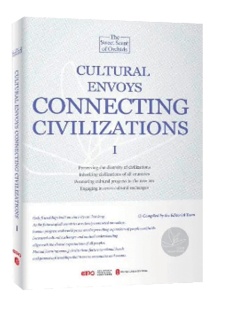
Cultural Envoys: Connecting Civilizations
Compiled by the editorial team
Paperback, 228 pages
Published by Foreign Languages Press
Mutual learning is a cornerstone for building a global community of shared future. Cultural Envoys: Connecting Civilizations introduces the winners of the Orchid Awards, a recent laurel instituted by the China International Communications Group to recognize the work of people worldwide who have made significant contributions to cultural exchanges and mutual learning between China and the rest of the world.
In Chinese culture, the orchid is a symbol of the noble qualities of a gentleman scholar. The inaugural Orchid Awards were given to 10 international figures dedicated to the cause of international cultural exchange. They are inheritors of various cultures, promoters of contemporary human progress, guardians of global diversity, and practitioners of cross-cultural exchange. They include leaders, educators, sinologists, artists and movers and shakers from other sectors.
The book opens with Joseph William Polisi, American educator and musician. The president emeritus of the Juilliard School, the renowned performing arts school in the United States, often referred to as the “Harvard of the music industry,” Polisi led the school for 34 years. In 2018, he became the chief China officer of the Tianjin Juilliard School (TJS), whose curriculum and traditions have their roots in the United States while embracing the Chinese culture, bringing together two great civilizations and transcending geopolitics.
“Music is an international language. In TJS, we have found that such commonality has created a magic power in promoting cultural exchanges which also has its role in soothing today’s international disputes and tensions,” Polisi said.
Mexican sinologist Flora Botton Beja’s China story started some 60 years ago. A professor of the Center for Asian and African Studies at EI Colegio de Mexico, her research is dedicated to China studies and she has created a network of students following in her footsteps across Latin America. She says understanding China’s complete traditional cultural system is essential to comprehending the country’s present and past.
David Ferguson, honorary chief English editor of the Beijing-based Foreign Languages Press, is a well-known name in China’s literary circles, especially for his editing of translations of Chinese classics and key government documents. He describes his work as trying to make the world understand China better. To make the outside world understand the country better, China’s stories need to be told well, which requires storytellers to avoid the over-reliance on formal political discourse. Storytelling is a way of connecting with people on an emotional level, and also a way to remedy the hostility that is being created in the West.
Essam Sharaf, a former prime minister of Egypt, has a decades-long bond with China. He led Egypt to have constructive dialogue with China, paving the way to realize the dream of building a global community with a shared future. He has championed the Chinese principle of harmonious coexistence amidst diversity and given momentum to cultural exchanges and mutual learning.
Dino Patti Djalal, founder and chairman of the Foreign Policy Community of Indonesia, is committed to the development of friendly relations between ASEAN and China, and Indonesia and China. In his view, China, more than any other country, will have a significant impact on the wellbeing of other Asian countries. Accordingly, ASEAN countries need to recalibrate their mindset as well as their policies towards China.
Carrillo Gantner, former cultural counsellor at the Australian Embassy in China, is also an artist who has directed and produced more than 200 plays. He promoted the performance of a large number of Chinese classics such as the 16th-century tragicomedy The Peony Pavilion and contemporary Chinese play Rhinoceros in Love in Australia, promoting cultural exchanges between Australia and Asia.
Russian sinologist Taras Ivchenko is the director of the first Confucius Institute in Moscow, witnessing its journey from inception to its current stature. Ivchenko sees language as an instrument of soft power that bridges hearts and minds, and is the most profound key to understanding a country.
Brazilian educator Luis Antonio Paulino, in collaboration with Chinese partners, is behind the first Confucius Institute in Brazil’s Sao Paulo State University. In addition, he edits and distributes Chinese-Portuguese journals in Portuguese-speaking countries, opening a window for the Portuguese-speaking world to see China.
Renowned Spanish translator Alicia Relinque has translated classical Chinese plays such as The Peony Pavilion and the 13th-century revenge play The Orphan of Zhao into Spanish, contributing to cultural exchanges between China and the West.
Japanese filmmaker Takeuchi Ryo’s documentaries, such as The Reason I Live Here and The Yangtze River, portray the economic and social development of China through the lens of a Japanese director’s decade-long observations and have created a channel for Japan to see contemporary China without prejudice.
These cultural envoys, who have deeply engaged with China, exemplify the power of mutual learning and the achievements born from the convergence of diverse civilizations. Their contributions have been pivotal in bridging cultural divides and fostering understanding and cooperation between civilizations.